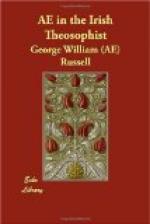“But why do you say it is universal? Is not that a frightful thought?”
“If God is the same yesterday, to-day, and to-morrow, then the life of Christ on earth was a symbol—must be a symbol—of what endures for ever: the Light and Darkness for ever in conflict: a crucifixion in eternity.”
This belief, so terrible, so pathetic, so strange, coming from this young girl affected Harvey profoundly. He did not reject it. The firmness and surety of her utterance, the moral purity of her character, appealed to him who felt his own lack of clear belief and heroic purpose. Like all spiritual people, he assimilated easily the spiritual moods of those whom he came into contact with. Coming from her, the moral, pathetic, and Christian doctrine had that element of beauty which made it blend with his ideal paganism. As he went homewards he pondered over her words, her life, her thoughts. He began to find an inexpressible beauty in her pity, as a feeling welling up from unknown depths, out of the ancient heart of things. Filled with this pity he could overcome his dislike of pain and go forth as the strong warrior of his momentary vision. He found himself repeating again and again her words: “We find in pain a secret sweetness—a secret sweetness—a secret sweetness.” If he could only find it, what might he not dare, to what might he not attain? And revolving all these things upon his restless pillow, there came over him one of those mystic moods I have spoken of: wandering among dim originals, half in dream and half in trance, there was unfolded within him this ancient legend of the soul:—
There was a great Gloom and a great Glory in nature, and the legions of darkness and the glorious hosts were at war perpetually with one another. Then the Ancient of Days, who holds all this within himself, moved the Gloom and the Glory together: the Sons of the Bright Fire he sent into the darkness, and the children of Darkness he brought unto the gates of the day. And in the new life formed out of the union of these two, pain, self-conscious, became touched with a spiritual beauty, and those who were of the Hosts of Beauty wore each one a Crown of Thorns upon the brow.
Chapter III.
Harvey rose up early; as he walked to and fro in the white dawn, he found the answers to every question in his mind: they rose up with a sweet and joyful spontaneity. Life became filled with happiest meaning: a light from behind the veil fell upon the things he had before disliked, and in this new light, pain, sorrow, and the old moralities were invested with a significance undreamt of before. In admitting into his own mind Olive Rayne’s ideas, he removed something of their austerity: what he himself rejected, seen in her, added another and peculiar interest to the saintly ideal of her which he had formed. She had once said, peace and rest were




